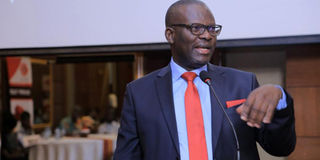Prime
Uganda Clays sacks Inholo, appoints finance boss to act

Relieved of duties: Mr George Inholo, who has been at the helm of Uganda Clays for six years was relieved of his duties by the UCL board last week. FILE PHOTO
What you need to know:
- Failed turnaround. According to Uganda Clays, Mr Mr George Inholo, who has been at the helm for six years, was sacked for failing to deliver on a turnaround and infights that had been fronted as an excuse for the failing performance.
Uganda Clays Limited (UCL) now has a new boss following the exit of Mr George Inholo, who has been at the helm for six years.
A notice yesterday indicated Ms Jacqueline Kiwanuka, the head of finance would take over the reins in acting capacity as UCL seeks to recruit a substantive boss.
“…there have been changes in top management affecting the managing director, head of production and head of human resources and support services all of whom have left the company by mutual consent,” the notice noted.
Mr Martin Kasekende, the Uganda Clays chairman, yesterday told Daily Monitor, Mr Inholo had been relieved of his duties over failure to deliver and turn around the company, noting “the results were not coming out properly”.
“We have stalled in growth and there is a lot of competition as we speak. We must up our game and get a team that can challenge what is going on and improve on shareholder value,” he said.
Sources close to the matter, who asked for anonymity to speak freely, also told Daily Monitor that there had been fights among top managers, which had been fronted as an excuse for the failing turnaround.
Asked about the internal fights, Mr Kasekende said management for whatever reason was not performing thus the board had thought it was important to replace them.
He also said there was need for a competitive management team that would overcome challenges and maneuver the evolving clay market dynamics to see the company return to sustained profitability.
When contacted yesterday, Mr Inholo said he had already resigned to the new reality, noting that changes happen in all organisations.
“Change is a factor of life. I knew at some point I would definitely leave. I think I have done my part. The company’s gross margins have improved, our image has also improved,” he said, adding that he has strong belief that the company will make a profit for the period ended December 31, 2019.
He also noted that whereas internal fights had provided some challenges, they had offered a positive and healthy work environment.
“For as long as there is a community, there will be areas where you disagree, but I never personalised any. Yes, we might have had areas of disagreement that it was on professional basis. I made sure they did not impact the organisation. Divergent views in a company are healthy,” he said.
Mr Inholo was tapped from Unilever, to replace Mr Charles Rubaijaniza, the Company Secretary turned managing director, who served from November 2010 to April 2013 when he was apparently made to resign as pressure for better results mounted.
Mr Inholo’s six year reign
Under Mr Inholo’s six year reign, UCL continued to battle inherited losses attributed to higher operating costs occasioned by the Kamonkoli investment in its expansion strategy.
Expansion to Uganda’s East in Kamonkoli in 2009 led to a loss of Shs700m due to a leap in company overhead costs.
The loss, however, did not come as a surprise because the firm undertook a pricey long term investment, costing it Shs32b.
But the capital consisted of about Shs25b borrowed from Standard Chartered Bank and East African Development Bank in 2008.
The loans doubled UCL’s financial risk and put a strain on its profitability.
UCL repaid the loans with money borrowed from National Social Security Fund, the company’s majority shareholder which has, to date, not been resolved as the latter is still in search of an investor.
The Fund is expected to kick start the process in which NSSF will retire an outstanding debt of Shs21b it holds in UCL.
While the company returned to profitability in 2016, the streak was short lived as the clay manufacturer tumbled back into losses in 2019.
The losses were in spite of the increase in revenue which was thereafter affected by an increase in overhead costs.
According to the board chairman, while Mr Inholo was instrumental in driving the company back to profitability which led to payment of dividends to its shareholders, a change in management was imperative to spearhead growth in the changing environment.




